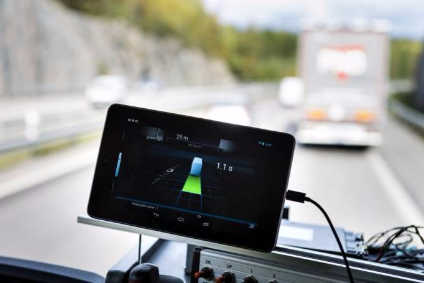
Early next month, the world’s first cross-border initiative with smart trucks will take place in Europe.
Six European truck manufacturers will bring platoons of semi-automated trucks to public roads, crossing borders from various European cities in order to reach their final destination of the Port of Rotterdam on 6 April. The overall objective of this ‘European Truck Platooning Challenge’ is to accelerate the introduction of truck platoons by putting the subject high on the agenda of EU policy makers.

Discover B2B Marketing That Performs
Combine business intelligence and editorial excellence to reach engaged professionals across 36 leading media platforms.
The Platooning Challenge – organised by the Netherlands as part of its ongoing EU Presidency – fosters European cooperation between truck manufacturers, member states, logistics service providers, road operators, road and vehicle approval authorities, research institutes and governments.
ACEA – the European vehicle makers’ trade association – said that such cooperation on platooning is vital to prevent countries from creating a patchwork of rules and regulations, which could hinder investments in automated and connected vehicles. Looking ahead, it said it is important that relevant legislation is harmonised throughout Europe and that countries recognise each other’s procedures and requirements.
Truck platooning is the linking of two or three trucks in a convoy. These vehicles closely follow each other at a set, close distance by using connectivity technology and automated driving support systems. The truck at the head of the platoon acts as the leader, with the vehicles behind reacting and adapting to changes in its movement. For example, if the platoon leader brakes, all the other trucks in the platoon also brake.
Truck platooning can help make road transport safer, cleaner and more efficient in the future. Platooning results in a lower fuel consumption, as the trucks drive closer together at a constant speed, with less braking and accelerating. Truck platooning therefore has the potential to reduce CO2 emissions by up to 10%. Likewise, connected driving can help improve safety, as braking is automatic with virtually zero reaction time compared to human braking. Finally, platooning also optimises transport by using roads more effectively, helping deliver goods faster and reducing traffic jams.
ACEA said that platooning will help the European truck industry to strengthen its technical leadership and global competitiveness. ACEA and its commercial vehicle members – DAF Trucks, Daimler Trucks, Iveco, MAN Truck & Bus, Scania and Volvo Group – are therefore actively supporting and participating in the European Truck Platooning Challenge. Truck platooning is also part of the industry’s integrated approach to further reducing CO2 emissions. This approach looks at all elements that affect emissions during the use of a truck. Besides the vehicle itself, trailer design, alternative fuels, logistics, infrastructure and intelligent transport systems (such as platooning) all play a decisive role in bringing down CO2 emissions.






